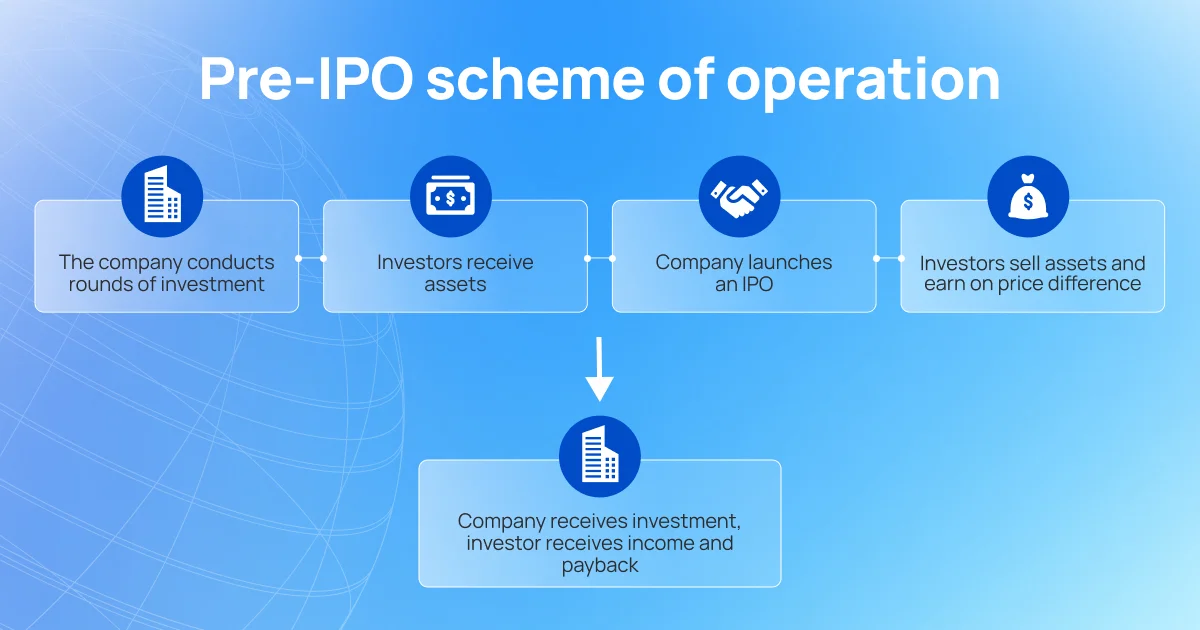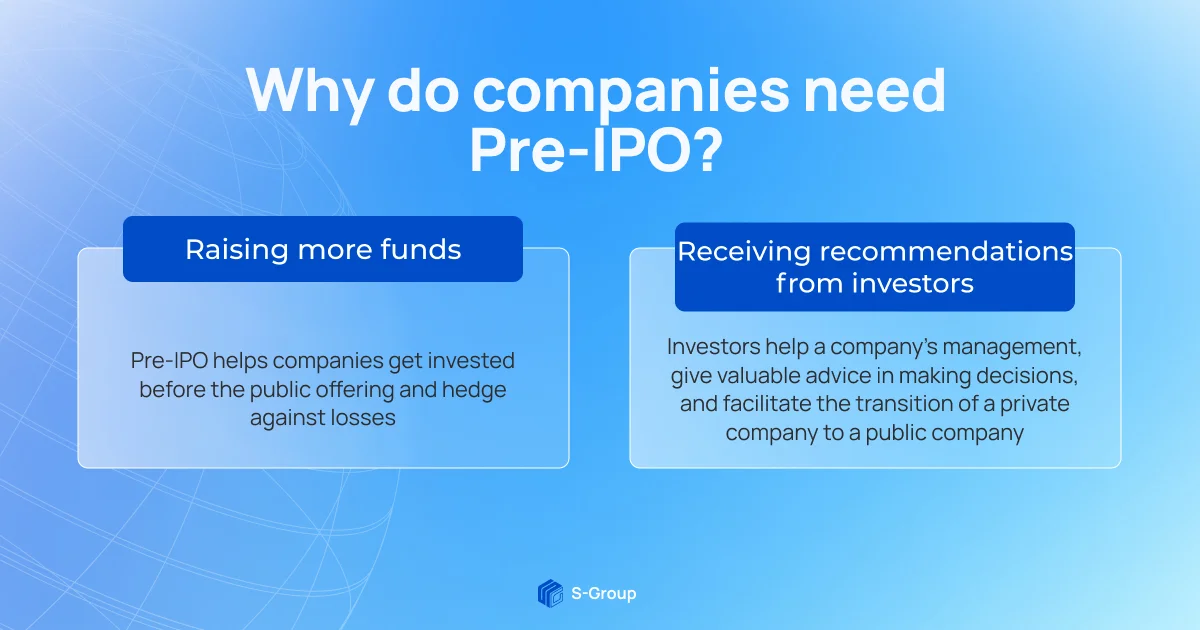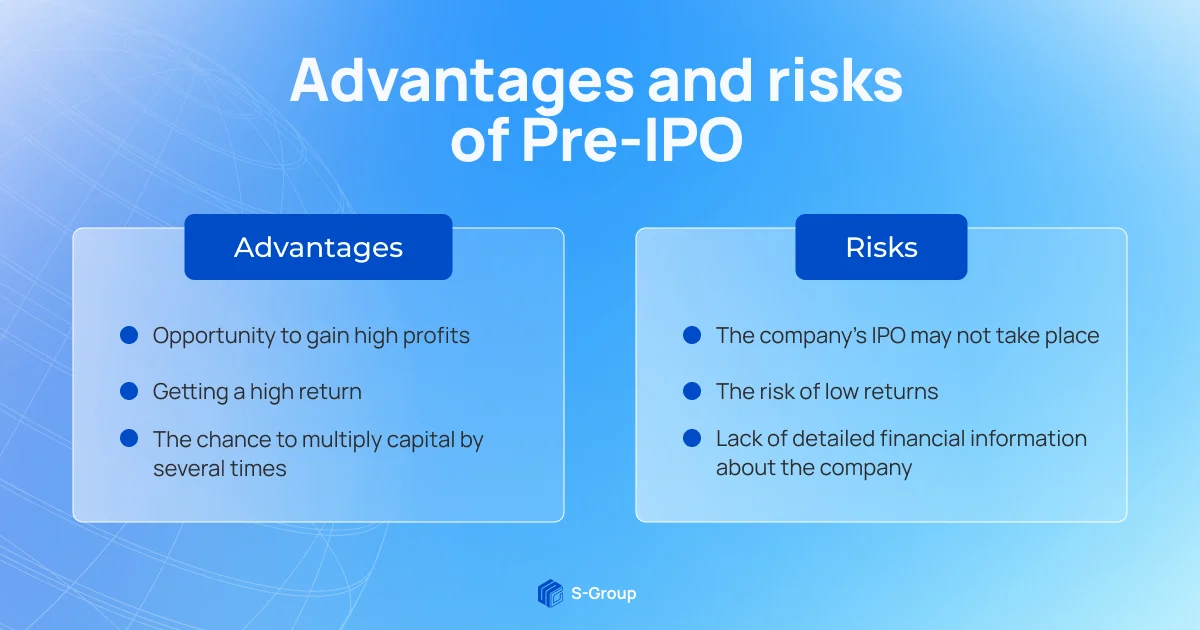Pre-IPO: definition, benefits and risks

Investing in shares of companies that went public and entered the stock market — a great way to earn money, which attracts many investors. By investing in an IPO, investors can not only make a profit, but also participate in the development of the company.
In addition to investing at the time of the IPO, when the company's shares are listed on the stock exchange, it is possible to buy assets before the official public offering. This process is called pre-IPO.
What is Pre-IPO, what are its advantages, and is it worth investing in the company's shares at the pre-offering stage? Find out the answers to these questions in our new article.
What is Pre-IPO and its essence for the company and investors
Pre-IPO is a process in which a private company sells stock to investors before it goes public. Pre-IPO shares are bought by private equity firms, venture capital funds, hedge funds or retail investors.
The process is as follows: the company conducts several rounds of fundraising, investors buy the assets and can sell them after the official listing on the stock exchange, earning on the price difference.

But it is important to remember that it is not possible to sell the purchased assets immediately after the placement on the exchange because of the lock-up period, which is set by the company. This is done so that a large number of investors do not start selling assets and do not collapse the share price.
An important advantage of participating in Pre-IPO for the investor is to buy assets at a lower price than during the IPO. This lower price is due to the risks an investor faces. For example, a drop in price or a company's failure to go public.
Why do companies participate in Pre-IPOs?

1. To raise additional funds
Preparing for the IPO is not only a long-term process, but also expensive, as the issue of securities requires a minimum of $1 million. After the IPO, a large number of factors may influence the share price: the economic and political situation, the opinion of the company and other events.
Therefore, there is a risk that the IPO will be unsuccessful and will not pay off. Pre-IPO helps companies to get investment before the public offering and hedge against losses.
In addition, pre-IPO shares are not subject to volatility and the company can sell large blocks of shares at a fixed price, receiving a predictable amount of funds.
2. Getting recommendations from investors
Pre-IPO shares are bought by large investment funds or experienced investors who have extensive experience in finance. They can help the management of the company, give valuable advice in making important decisions, facilitate the transition of a private company into a public one.
Advantages of Pre-IPO for investors
Investing in Pre-IPO has a large number of benefits that are hard to replicate in any other investment market. Let's take a look at the main ones.
1. Opportunity to make high profits
The main reason why many experienced investors prefer to invest in pre-IPO stocks. If you choose a promising company, you can get a serious return on investment.
For example, one of the most prominent pre-IPOs was that of Alibaba Group, an e-commerce company based in China. The company's management announced its IPO in 2014 and opened the first round of Pre-IPOs to the wealthiest investors.
One of the investors was Singapore-based venture capitalist Ozi Amanat, who bought a $35 million stake. He bought the assets for less than $60 per share and then distributed the shares to Asian investors affiliated with his K2 Global fund.
On the first day of public trading, the asset price rose to $90 per share. This allowed Ozi Amanat and other investors to get a 50% return on their investment. As of early November 2020, the price reached $276.
2. Pre-IPO stock is available at an undervalued price
Buying the company's assets before the official offering carries some risk for investors because it is unclear how the company will perform after the IPO. To compensate investors for this risk, at Pre-IPO, companies sell shares at an undervalued price.
For example, if a company sets a price per share at the IPO of $20, it may offer investors a value of $10 per asset at the pre-IPO. This would allow investors to make money even if the IPO is not successful.
Suppose a company's IPO share price drops from $20 to $15 because of a political crisis, pandemic, or other reason. Investors who bought the stock for $20 will take a loss. It will take them several months to stabilize their financial situation. Investors who bought the stock for $10 will not be affected and will be able to make money.
3. Chance to multiply your capital several times over
One of the main advantages of Pre-IPO for an investor is that you are investing in a company that is on the growth path. If the company is doing well, you can make a huge profit on its stock. This way, your investment can not only pay off, but also provide a good financial cushion.
The Risks of Investing in Pre-IPOs
Like any other investment, Pre-IPO stocks also have some risks. Before you make an investment decision, you should take into account the possible risks.
1. The risk of low returns
When investing, you and no one else can guarantee the success of the company and that the stock will rise in value. If the IPO is unsuccessful and there is no demand for the shares, you will not make the expected profit.
2. The company's IPO may not happen
Investors invest in a company's stock at Pre-IPO with the expectation that it will go public in some time. But, the IPO may be delayed or not happen at all due to company problems: bad reputation, difficulties in documentation, lack of funding, etc.
For example, Ant Group (a subsidiary of Alibaba Group) was expected to go public in November 2020. At a valuation of $34.5 billion, it was the largest and most anticipated initial public offering. But the IPO was canceled almost before it started because of regulatory problems.
3. Lack of detailed financial information of the company
When entering the IPO, companies are obliged by law to make the financial information publicly available, but there is no such requirement for private organizations. So there is a risk that investors will not get a sufficient amount of information about the company. So you have to act intuitively and take the issuer at his word.

What to keep in mind when investing in Pre-IPO
To minimize the risks associated with investing in Pre-IPO, remember the following rules.
🔷 Before you invest, do your research
Learn as much as you can about the company you are going to invest in. Answer the following questions: is there demand for the company's services, is the projected growth rate realistic and achievable, is the stock price reasonable. The answers to these questions will help you understand whether the investment is worthwhile.
🔷 Read the private placement memorandum carefully
This is a document that contains the information you need to decide whether or not to invest in the company. The memorandum includes information about the company, its management, customers, products, results, financials, and potential risks that investors should consider.
If you don't have the expertise to thoroughly review the document, seek help from an independent financial advisor or stockbroker.
🔷 Do not invest large sums at once
Don't invest large amounts of money in a company's stock, especially if this is your first time investing in Pre-IPOs. Start small and gradually increase the size of your investment.
🔷 Be patient
Pre-IPO investing is not a get-rich-quick scheme. It can take months or years before a company goes public. Even after the IPO, the share price may not rise immediately. Therefore, it's crucial to be patient and focus on investing for long-term returns rather than expecting a quick payback.
🔷 Be realistic in your expectations
The stories of people who have invested in Amazon, Google or Apple in the beginning of their journey are very motivating. But, it's important to remember that not every company can turn into Google, Amazon or Apple.
Don't look for new giants, look for all the companies that are promising and doing well.
Is it worth investing in Pre-IPOs?
Investing in Pre-IPOs can be a strategic way to make big profits in the future. If you manage to invest in a promising company at the right time, you can get not only a return on your investment, but also a good return.
Even despite the list of risks, the benefits of investing in a Pre-IPO are far greater. If you have the resources and a promising company in mind, don't pass up this investment opportunity.
Share
Interesting
Would you like to receive a digest of articles?
One email with the best articles of the week.
Sign up so you don't miss anything.